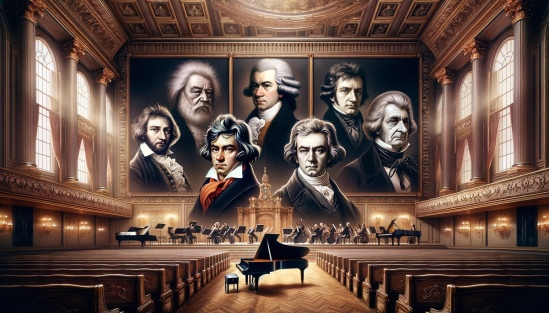
Fain
Sammy Fain was a prolific American Composer of popular songs, including many for Broadway musicals and Hollywood motion pictures. Numbered among his best-known tunes are “Let a Smile Be Your Umbrella,” “Tender is the Night,” and “I’ll Be Seeing You,” all of which became standards. He lived from 1902 until 1989.
de Falla
Fiedler
Arthur Fiedler lived from 1894 until 1979. He was born in Boston, Massachusetts and trained as a violinist there and Berlin. He joined the Boston Symphony in 1915 aand stayed there until 1930, first playing violin, then viola. Determined to conduct, he founded his own chamber orchestra, the Boston Sinfonietta, in 1924. In 1929 he launched the Esplanade summer series, free concerts by the Boston Symphony, along the Charles River. In 1930 he took over the Boston Pops Orchestra and for almost a half century he was the most beloved conductor of light-classical music in the United States.
At one time there were so many Fiedler’s associated with the Boston Symphony that people assumed they were all related. The most famous, Arthur, conducted the Boston Pops for 50 years. Other Fiedlers who’ve “fiddled” with the Boston Symphony orchestra in some way include his father, two uncles and a cello-playing cousin.
July 4, 1999, Arthur Fiedler’s son was in charge of the cannon fired during the traditional playing of the 1812 Overture on the Esplanade in Boston.
Active in promoting music through various mediums, he was also made an honorary fire chief because of his practice of chasing every major fire, day or night, and became a familiar figure to Bostonians at the scene of the fires.
Field
John Field lived from 1782 until 1837 and was an Irish pianist and composer. He has been credited the invention of the Nocturne, a form later adopted and developed by Chopin. Field was born in Dublin in 1782, the son of a violinist, but moved with his family to London in 1793, perhaps taking violin lessons from Haydn’s friend Salomon. He became an apprentice of Muzio Clementi, appearing in a series of important London concerts, and later touring widely. After concerts in Russia, he remained in St. Petersburg, where he became a fashionable teacher and performer, moving to Moscow in 1821. Illness brought him, in 1831, to London again, a visit followed by a continental tour and a final return to Moscow, where he died in 1837.
Flowtow
Friedrich Adolf Ferdinand, Freiherr von Flotow was a German composer. He is chiefly remembered for his opera Martha, which was popular in the 19th century and the early part of the 20th.
Fodor
Eugene Fodor, born in 1950, is a brilliant violinist. He made solo debut at age 10 with the Denver Symphony and won first national competition at age 12. He was awarded full scholarships at the Juilliard School of Music in New York, Indiana University and the University of Southern California, where he studied with Ivan Galamian, Josef Gingold and Jascha Heifetz, respectively. His first ten years of study were with Harold Wippler. At the age of ten,he made his solo debut with the Denver Symphony, playing the Bruch Concerto. Touring began at the age of twelve after winning first prize in a national competition. At fifteen, he performed with the Detroit Symphony. Before the age of seventeen, he won numerous national contests including First Prize in both the Merriweather Post Competition in Washington, DC and the Young Musicians Foundation Competition in Los Angeles. In 1972, he won First Prize in the International Paganini Competition in Italy, and in 1974 won the highest prize awarded that year in the Tchaikovsky International Competition in Moscow. In January 1999, he was notified he had won the European Soloist award “Prix European du Soliste” which was presented to him in Paris in November 1999, the same evening of his concert at the Theatre des Champs-Elysees.
Foster
Steven Collins Foster was America’s best-loved songwriter. He played the flute when he was four and had completed his first composition at fifteen. His songs capture the spirit and flavor of America and have remained popular over the years.
Foster, born in Pittsburgh, had visited the South one time and from then on, identified himself and his songwriting with the Deep South. Oh! Susanna was the first in a long list of enduring sing~alongs composed by Stephen Foster, and made popular by the Christy Minstrels, the most successful troupe to tour America in the mid-1800s.
Other Foster songs performed by Foster, himself, and the Christy Minstrels included Camptown Races, Old Folks at Home, My Old Kentucky Home, Jeannie with the Light Brown Hair and Old Black Joe. Get out that banjo and start strumming … “Oh! Susanna, oh don?t you cry for me, for I come from Alabama with my banjo on my knee…”
There is a statue of Steven Foster, who died in 1864, in Pittsburgh.
Frescobaldi
Girolamo Frescobaldi lived from 1583 until 1643. He was an Italian composer who wrote music for the harpsichord and was one of the first great masters of organ compositions.
Froberger
Johann Jacob Froberger lived from 1616 until 1667. He was a German composer, organist and harpsichordist whose keyboard compositions are among the richest of the early Baroque era.
Fučík
Julius Fučík was a Czech composer and conductor of military bands. He became a prolific composer, with over 400 marches, polkas, and waltzes to his name. As most of his work was for military bands, he is sometimes known as the “Bohemian Sousa”.
